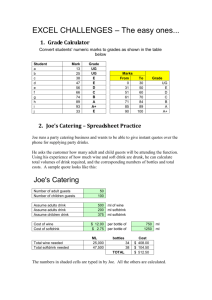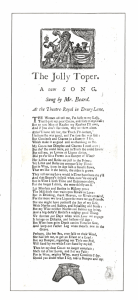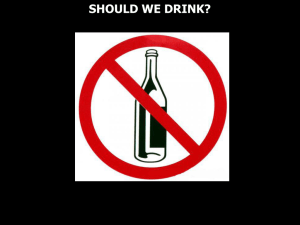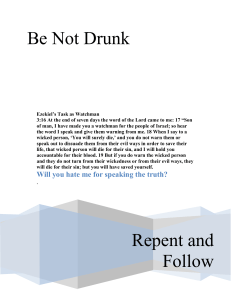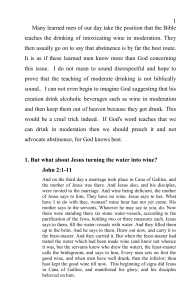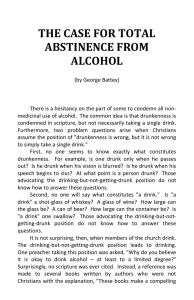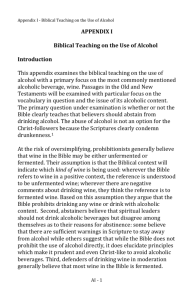G_0547_Alcohol_and_Nutrition_Claims
advertisement
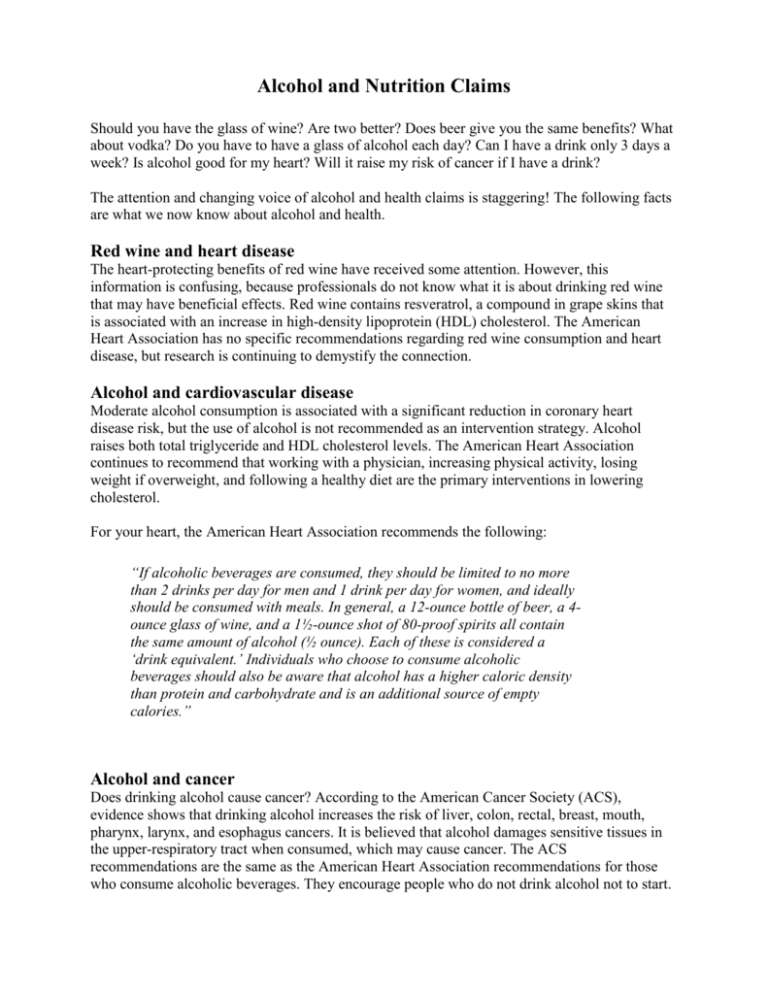
Alcohol and Nutrition Claims Should you have the glass of wine? Are two better? Does beer give you the same benefits? What about vodka? Do you have to have a glass of alcohol each day? Can I have a drink only 3 days a week? Is alcohol good for my heart? Will it raise my risk of cancer if I have a drink? The attention and changing voice of alcohol and health claims is staggering! The following facts are what we now know about alcohol and health. Red wine and heart disease The heart-protecting benefits of red wine have received some attention. However, this information is confusing, because professionals do not know what it is about drinking red wine that may have beneficial effects. Red wine contains resveratrol, a compound in grape skins that is associated with an increase in high-density lipoprotein (HDL) cholesterol. The American Heart Association has no specific recommendations regarding red wine consumption and heart disease, but research is continuing to demystify the connection. Alcohol and cardiovascular disease Moderate alcohol consumption is associated with a significant reduction in coronary heart disease risk, but the use of alcohol is not recommended as an intervention strategy. Alcohol raises both total triglyceride and HDL cholesterol levels. The American Heart Association continues to recommend that working with a physician, increasing physical activity, losing weight if overweight, and following a healthy diet are the primary interventions in lowering cholesterol. For your heart, the American Heart Association recommends the following: “If alcoholic beverages are consumed, they should be limited to no more than 2 drinks per day for men and 1 drink per day for women, and ideally should be consumed with meals. In general, a 12-ounce bottle of beer, a 4ounce glass of wine, and a 1½-ounce shot of 80-proof spirits all contain the same amount of alcohol (½ ounce). Each of these is considered a ‘drink equivalent.’ Individuals who choose to consume alcoholic beverages should also be aware that alcohol has a higher caloric density than protein and carbohydrate and is an additional source of empty calories.” Alcohol and cancer Does drinking alcohol cause cancer? According to the American Cancer Society (ACS), evidence shows that drinking alcohol increases the risk of liver, colon, rectal, breast, mouth, pharynx, larynx, and esophagus cancers. It is believed that alcohol damages sensitive tissues in the upper-respiratory tract when consumed, which may cause cancer. The ACS recommendations are the same as the American Heart Association recommendations for those who consume alcoholic beverages. They encourage people who do not drink alcohol not to start. Alcohol and stress Many people consume alcohol to reduce feelings of stress or anxiety in their lives. Research finds that alcohol in low doses may lessen the body’s response to stressors, but many studies show just the opposite effect—alcohol really increases the stress response by stimulating production of the same hormones the body produces when under stress. No conclusions on the alcohol and stress connection exist at this time. References and recommended readings Academy of Nutrition and Dietetics. Nutrition Care Manual®. Available at: www.nutritioncaremanual.org. Accessed January 4, 2012. American Cancer Society. Alcohol use and cancer. Available at: http://www.cancer.org/Cancer/CancerCauses/DietandPhysicalActivity/alcohol-use-and-cancer. Accessed November 16, 2011. American Heart Association Nutrition Committee, Lichtenstien AH, Appel LJ, et al. Diet and lifestyle recommendations revision 2006: a scientific statement from the American Heart Association Nutrition Committee. Circulation. 2006;114:82-96. Available at: http://circ.ahajournals.org/content/114/1/82.full.pdf. Accessed November 16, 2011. Mahan LK, Escott-Stump S, Raymond JL. Krause’s Food and Nutrition Care Process. 13th ed. St Louis, MO: Elsevier Saunders; 2012. Stoppler AC. Alcohol & stress: at risk for alcoholism? Available at: http://www.medicinenet.com/script/main/art.asp?articlekey=54999. Accessed November 16, 2011. Review Date 12/11 G-0547


